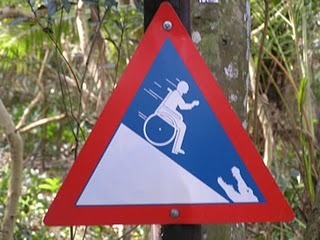Thoughts on a Day of Waiting ...

(Warning sign for the wheelchair-dependent in China; reminiscent of a scene in Vertical.)
So, I finally joined the Twitter crowd. I sort of understand it, and I sort of don't. I guess E-mail is borderline moribund, especially logorrheic e-mail, which I'm wont to write. If the Internet wasn't already obliterating deep immersive reading, certainly Text-ing (hate that word) and Tweeting (even more embarrassing) are surely driving our increasingly shorter and shorter attention spans into veritable oblivion. I'm no exception. I'm just as guilty as the rest of the world. And yet every day I feel this tremendous need to turn everything off and just read, in silence — whatever I can buy living on this prosperous alley where gleaners come in all social classes — and let myself go to another world. What did Jung say? "We owe an incalculable debt to the imagination." The Internet is destroying the pure imagination of our discrete intracranial theaters.
I was pondering this a few months ago while watching HBO's 5-hour miniseries, Mildred Pierce, starring Kate Winslet. It was nominated for 21 Emmy's, and though it didn't win as many as it had hoped, there was something interesting about it to me, a writer, a writer of novels — as well as screenplays, too. Todd Haynes, the director, dared to take James M. Cain's lesser novel — which had previously been made into a feature film starring Joan Crawford and utterly vitiated in terms of what they did in changing the plot — and film it virtually scene for scene, word for word. I have to admit, it kind of dawdled in places and, like I said, it's not Cain's best — that would be The Postman Always Rings Twice and Double Indemnity — but what amazed me was not only the fealty to the source material, but how a novel, a deeply feminist, period piece one at that, could have another chance in film form, thanks to HBO.
Why do I bring this up? I fear for the future of the novel, especially longer novels. I fear so much I'm not sure I would ever embark on writing one again. For a long time I've wanted to adapt Raymond Chandler's masterpiece, The Long Goodbye. It was made by Robert Altman in 1973 and the result, which I re-watched a few weeks ago, starring Elliot Gould as Philip Marlowe (??) is atrocious, one of the worst films I've ever seen. If it was any other film I wouldn't care. But it was a film based on the great Raymond Chandler's magnum opus, a book he labored on for over five years, and Altman treated it like some airport rack, dime-store novel, destroyed everything about it that made it so masterful. So, as I said, I've always wanted to do it, or adapt it and have someone else direct it, but as the studios have grown increasingly risk-averse with their franchise films and 3-D poppycock and sequels and prequels, a film like The Long Goodbye would just be too expensive, probably not appeal to a mainstream audience because, after all, it's a pretty downbeat novel in the end, even if Marlowe does solve the brilliantly convoluted case. I.e., it would never get made today by a studio.
But … but, after seeing Mildred Pierce, a flare went off in my head: a 5-hour miniseries on HBO or wherever. You can do period cheaper on television because you don't have to recreate backgrounds with such accurate verisimilitude. And The Long Goodbye needs that 5-hour leisurely pace to really play out its sensibility of deep lament. You can't truncate that novel to two hours and hope to have it make much sense, let alone elicit the themes that Chandler worked so hard to achieve.
So, I guess what I'm saying is that maybe the future of novels is in their being TV miniseries.
That said, Snooki has 1,000,000 more Twitter Followers than the Dalai Lama. Bravo, which started out as a cable channel devoted to independent and foreign films, is now the all Real Housewives from Airhead Nowheresville. Kim Kardashian is a mega-star for doing nothing except being a friend of Paris Hilton, who has never done anything except being born with a silver spoon in her mouth, and for being in a sex tape — well, both of them. Almost all newspapers now are practically nothing more than content farms, including the once Top 10 paper, The Los Angeles Times. Nothing is sacred. It's open season on anything that once had substance. Conversations are shorter. You have to make phone reservations through E-mail and text-ing just to talk to a real human voice these days.
Just some thoughts while I wait on notes on the last draft of my HBO pilot. I'm very excited about the Sideways play because it means I'll get to go to a theater 5 days a week for casting and rehearsal and all the rest and interact with real human beings and not be married to my laptop and smartphone. Maybe, too, theater is the future of the novel as well.
I still believe in the novel. Please don't die on me.



